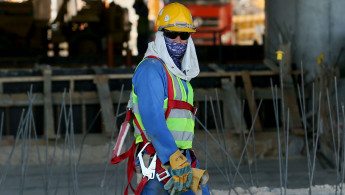Qatar says it will reform sponsorship system for workers
Qatar has said it will push ahead with reforming its controversial "kafala" or sponsorship system for foreign workers without giving a timetable for when this will happen.
3 min read
Qatar, the 2022 World Cup host is under pressure to reform labour laws. [AFP]
The Qatari Minister of Labour and Social Affairs said Monday the employment sponsorship system in Qatar is to be replaced with a new one based on contracts signed between workers and their employers.
Abdullah Ben Saleh al-Khulaifi said the new law would balance between the rights of the sponsor and the sponsored, and regulate relationship between them. It will also give workers more rights."I cannot say when the law will be issued because that depends on the legislative cycle and it needs the prince to issue a decree," he added.
The minister was speaking during a meeting in Doha with the heads of diplomatic missions. He said the alternative law is still being reviewed by the concerned committees in the Shura Council. This happened after the cabinet referred it to the Shura Council for discussion and recommendations.

The minister admitted there was opposition to the Shura council abolishing the sponsorship law. He explained that the Shura Council was legally entitled to amend the alternative law and send its recommendations to the cabinet, adding that the Shura Council would only ratify a law that is in the interest of Qatar and the Qataris.
Khulaifi said the cabinet had not yet received any amendments from the Shura Council to the alternative law, and that the biggest challenge lies in the presence of 1.5 million expats, that brings Qatar's non-native labour population to 80 percent.
The interior minister is trying to guarantee the rights and safety of workers in Qatar, he argued. He explained that the government is serious about improving working conditions and plans to build new housing units to high standards. He revealed plans to build 150,000 additional housing units for expats working in infrastructure projects for the 2022 World Cup that is to be hosted by Qatar.
The Labour Ministry is seeking to tighten censorship by increasing the number of existing health and occupational inspectors to 200. The ministry plans to increase this number to 300. In 2014, the ministry carried out 51,000 additional inspection visits to workplaces to ensure companies are complying with labour law and occupational safety standards.
Khulaifi said his ministry had received 94,000 complaints over the past year. A total of 6,800 of these were addressed by the ministry, while 800 were referred to the judiciary. He also said his ministry is currently following up on 95,000 complaints filed by workers over the past months.
Last year, 55 Nepali recruitment agencies were banned from supplying workers to Qatar for human rights violations. Eleven other recruitment agencies were banned for the same reason this year, the minister added.
This article is an edited translation from our Arabic edition.
Abdullah Ben Saleh al-Khulaifi said the new law would balance between the rights of the sponsor and the sponsored, and regulate relationship between them. It will also give workers more rights."I cannot say when the law will be issued because that depends on the legislative cycle and it needs the prince to issue a decree," he added.
The minister was speaking during a meeting in Doha with the heads of diplomatic missions. He said the alternative law is still being reviewed by the concerned committees in the Shura Council. This happened after the cabinet referred it to the Shura Council for discussion and recommendations.

| The minister admitted there was opposition to the Shura council abolishing the sponsorship law. |
The minister admitted there was opposition to the Shura council abolishing the sponsorship law. He explained that the Shura Council was legally entitled to amend the alternative law and send its recommendations to the cabinet, adding that the Shura Council would only ratify a law that is in the interest of Qatar and the Qataris.
Khulaifi said the cabinet had not yet received any amendments from the Shura Council to the alternative law, and that the biggest challenge lies in the presence of 1.5 million expats, that brings Qatar's non-native labour population to 80 percent.
The interior minister is trying to guarantee the rights and safety of workers in Qatar, he argued. He explained that the government is serious about improving working conditions and plans to build new housing units to high standards. He revealed plans to build 150,000 additional housing units for expats working in infrastructure projects for the 2022 World Cup that is to be hosted by Qatar.
The Labour Ministry is seeking to tighten censorship by increasing the number of existing health and occupational inspectors to 200. The ministry plans to increase this number to 300. In 2014, the ministry carried out 51,000 additional inspection visits to workplaces to ensure companies are complying with labour law and occupational safety standards.
Khulaifi said his ministry had received 94,000 complaints over the past year. A total of 6,800 of these were addressed by the ministry, while 800 were referred to the judiciary. He also said his ministry is currently following up on 95,000 complaints filed by workers over the past months.
Last year, 55 Nepali recruitment agencies were banned from supplying workers to Qatar for human rights violations. Eleven other recruitment agencies were banned for the same reason this year, the minister added.
This article is an edited translation from our Arabic edition.





 Follow the Middle East's top stories in English at The New Arab on Google News
Follow the Middle East's top stories in English at The New Arab on Google News
![Israeli forces ordered bombed Gaza's Jabalia, ordering residents to leave [Getty]](/sites/default/files/styles/image_330x185/public/2176418030.jpeg?h=a5f2f23a&itok=_YGZaP1z)

